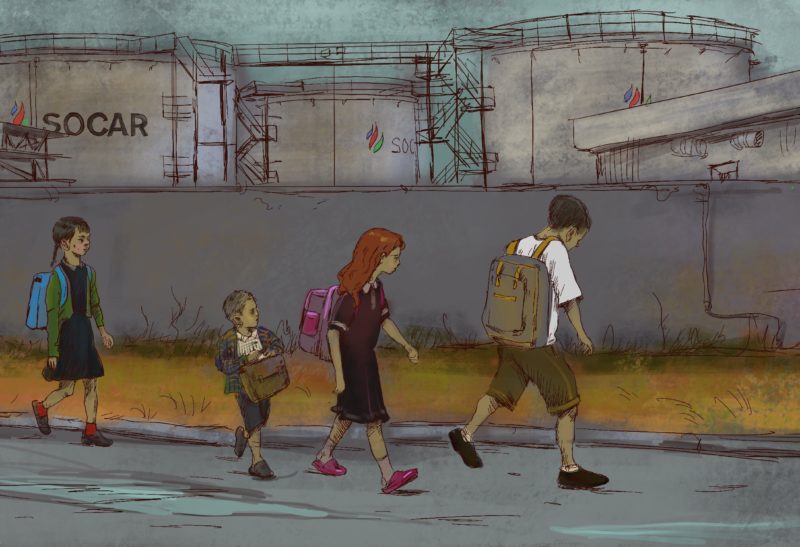
Harmful substances in diesel fuel cause health issues
Natig Valiyev, who lives in
Baku
, has driven diesel-fueled cars for 13 years:
“I always bought diesel-fueled cars because of their low fuel consumption. The quality of diesel is so low, however, that the car uses up much more than you think. It consumes 10 to 12 liters per 100 kilometers because the components of the diesel are not right. My car broke because of the diesel I used, and I had it towed to a mechanic. I refueled my car with diesel, drove it for one kilometer, and then it broke. I talked to the mechanic and he said it was because of the diesel, it had damaged a valve. And I am not the only one who experienced something like this.”
A group of journalists from Azerbaijan and Georgia have researched the quality of diesel fuel sold in both countries at gas stations that belong to the State Oil Company of Azerbaijan
(SOCAR)
.
They took samples from SOCAR gas stations in both countries and gave them to Magi LTD, a Tbilisi-based independent lab. The test results showed that the quality of diesel SOCAR sold in
Azerbaijan
was as much as 21 lower than required by European standards, while the quality of diesel sold in
Georgia
was only two times lower than European standards require.
According to European standards, the amount of sulfur in diesel fuel cannot exceed 10 ppm (parts per million). The amount of sulfur in diesel sold by SOCAR was found to be 216 ppm in
Azerbaijan
and 22 ppm in
Georgia
, showing that the fuel is low quality and environmentally harmful.

Driver Natig Valiyev continues to criticize the components of diesel sold in Azerbaijan:
“With 10 liters of diesel sold in Georgia, you can drive 150 to 200 kilometers, while in Azerbaijan, you would only be able to drive 80 to 90 kilometers. There is a difference in terms of the distance your car can cover – the mileage, and the diesel also damages your car. People bring over a car from Georgia that always ran on Georgian fuel. Once they start using Azerbaijani fuel, it breaks down. In one word, the quality of diesel here is zero.”
Azerbaijan is on the list of countries that use low-quality diesel
In 2017, the International Fuel Quality Center (IFQS)
released
a ranking of countries that produce diesel fuel with the least amount of sulfur. The highest quality and most environmentally friendly diesel is sold in Sweden, Germany and Japan. Azerbaijan, which extracts and refines oil, however, is on the list of countries using low-quality diesel.

An annual
report
released by the State Statistics Committee shows that SOCAR fully supplies the domestic market and exports more than half of the diesel produced.
Although SOCAR officials have occasionally stated how much diesel fuel is produced, they have not provided details about its quality. Davud Mammadov, SOCAR vice-president for oil refining,
told
the press in 2014 that fuel produced in Azerbaijan fully met the demand within the country. However, the quality of this fuel does not meet modern standards.
The quality of diesel that SOCAR sells in Georgia is 10 times better than the quality of diesel it sells in Azerbaijan
A joint study conducted by the Organized Crime and Corruption Reporting Project (OCCRP) and Studio Monitori back in 2014
found
that the quality of diesel fuel sold by SOCAR gas stations in Georgia was 60 times worse than European standards would require. The latest laboratory results show that SOCAR has improved the quality of its diesel fuel in Georgia, and that it is ten times better quality than the diesel sold in Azerbaijan.
Since March 2017, Georgians no longer
need
a visa to travel to EU countries. This decision also meant closer alignment to EU standards.

SOCAR sells quality diesel to foreign countries to protect its image
Mirvari Gahramanli
, rights activist and the chairwoman of the non-governmental alliance Oil-Workers Rights Protection Organization (OWRPO), says that there is no agency to check SOCAR’s standards within Azerbaijan:
“Diesel sold at SOCAR’s gas stations in Georgia, and maybe also other countries, will meet the standards. This is to protect SOCAR’s international image. The government is perhaps more interested in selling products that do not meet universal standards in Azerbaijan, because non-compliance with standards is a case of corruption.”
SOCAR has gas stations operating under the same name in five other countries of the world: Georgia, Ukraine, Turkey, Switzerland, Romania. Most of the company’s gas stations are in Georgia.

Fuel components not meeting standards causes lung cancer
Adil Geybulla, doctor of medical sciences, spoke to Meydan TV about health issues in Azerbaijan caused by harmful substances in diesel. He said that during ignition, sulfur bonds with oxygen or water and generates various sulfates:
“When those compounds get into the human body, they enter the airways and сome into contact with the skin. They can cause various allergic reactions, skin rashes, airway inflammation, or cancerous tumors.”
The fact that SOCAR has improved the quality diesel sold in Georgia, where it is the largest taxpayer, does, however, not mean that it fully complies with environmental standards. The diesel still does not meet European quality requirements, and SOCAR’s stations burden the environment.
Georgians: We are disturbed by the heavy odor and dust here
Georgians who live close to SOCAR’s main fuel base near Tbilisi airport complain that the oil company’s non-compliance with environmental standards causes health problems for them and their children:
“We all experience problems with blood pressure, and we all have headaches. This has not been the case before at all, it is because the SOCAR base is located here. Our children have lung problems, bronchitis and are neurotic. My 11-year-old has a problem with the thyroid gland and I believe the reason for this is that the SOCAR base located here.”

Children vomit or have a stomachache
Rights activist Mirvari Gahramanli says that similar things happen in Azerbaijan as well, and that SOCAR’s oil refinery located in the settlement of UPD in the Khatai district causes considerable damage to the environment:
“Young children there get poisoned with a mysterious virus. They suddenly vomit or have a stomachache. Nobody knows what causes this. You take your kid to the doctor and the doctor says, ‘it’s a virus’. People experience problems with their blood pressure and die from cancer – these are consequences caused by the factory.”
There is no progress, even following orders issued by the president and a resolution issued by the Cabinet of Ministers
At a meeting of the Cabinet of Ministers that President Ilham Aliyev
held
in January 2014, he issued orders to promote the environmental safety of citizens, strengthening environmental protection and combatting the factors that contribute to air pollution.
Since vehicles are the main reason for air pollution, the Cabinet of Ministers issued a resolution to introduce the Euro 4 standard, one of six stages that define European emission standards. Even though the resolution was issued immediately after the meeting three years ago, there has not been any progress towards improving the components of fuel sold in Azerbaijan.
In 2008, the
research
company Mercer Human Resource Consulting named Baku the filthiest city on the planet. Things were still the same in 2010, when the international ranking company NYC Partnership Consulting called Baku the dirtiest city in the world. Both rankings were based on levels of air pollution. Even though it has been 10 years since 2008, there are no changes. Air pollution is still at the
highest level
in Azerbaijan’s capital Baku, home to about half of the country’s population.
SOCAR officials did not respond to our request for comment on the study.
The State Committee for Standardization, Metrology and Patents issues patents for the quality of fuel components in Azerbaijan.

Fazil Talibov, the head of the committee’s press service, said that no violation of standards has been found in the components of diesel produced in Azerbaijan, and that the fuel fully meets the required standards:
“In Azerbaijan, diesel fuel is produced at the Heydar Aliyev Oil Refinery and is distributed to gas stations. The Petrochemical Product Testing Laboratory of the Azerbaijani Standardization Institute regularly examines samples brought from the refinery for components, safety, and the weight content of sulfur. In the past few years, no violation of standards has been found regarding the components of diesel fuel produced at the refinery. Azerbaijani legal regulations have also been brought in line with international requirements. Therefore, standards in Azerbaijan and standards in foreign countries cannot be different from each other.”
An annual report that SOCAR
released
in 2016 says that the research laboratory of the oil company’s ecology department carried out more than 30,000 tests in 2016 alone. Also, SOCAR’s operating companies supposedly conducted 1,185 environmental monitoring exercises the same year. However, the company does not publicize the results of those tests or monitoring exercises.
Humans are the victim in all cases
Rights activist Mirvari Gahramanli spoke about the quality of fuel that SOCAR sells in Azerbaijan and the company’s responsibilities. She criticized the oil company’s reports for lack of transparency:
“SOCAR inflicts the biggest damage on the environment. In 2015, for example, SOCAR was fined 126,000 manats, while BP was fined 142,000 manats. I am doubtful in this regard – SOCAR poisons the air, the water and the land, but damage inflicted by BP is publicized because they are transparent in their reports. I have serious doubts about SOCAR’s reports. Both the ministry of health and the ministry of ecology’s monitoring group should carry out more profound research. Because in all cases, humans are the victim.”
The investigation has been published with
N-ost
support.



